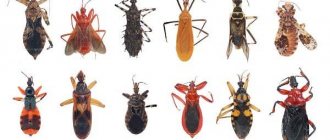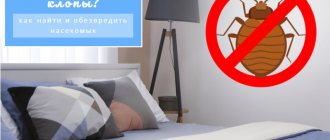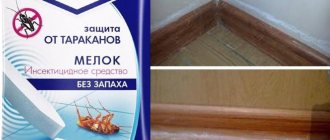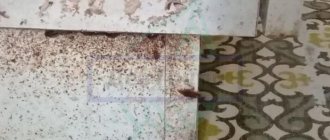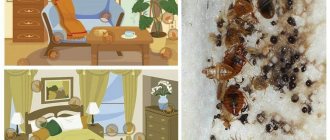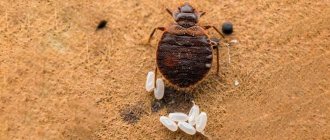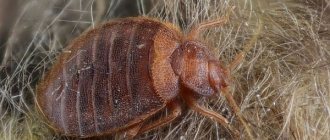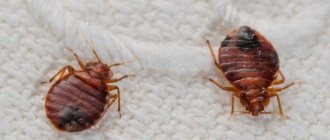Who and what are bed bugs afraid of?
Many people are afraid to use synthetic insecticides to control the voracious bloodsuckers in their home. This is understandable, because most of these substances are poisons.
Therefore, in today’s article you will learn what bed bugs are afraid of, meaning both natural repellents and the insects that feed on them and can also live in your home. Some herbs, essential oils, and other natural repellents will be covered.
I would like to note right away, with all the love for natural and safe remedies, if there are bedbugs in your house, this will only bring temporary relief, but will never rid your apartment of these insects. This requires careful preparation and a combination of several methods.
Who eats bed bugs
Perhaps you think that if a colony of cockroaches or ants appears in your house, you will definitely get rid of bedbugs. On the one hand, you are right, these insects really eat bedbugs, and they, in turn, are very afraid of them.
But on the other hand, are you sure that this will be a good solution to this problem? Do you want cockroaches, spiders or ants crawling on your bed? Important! Now you will recognize the natural enemies of bed bloodsuckers. They are not even deterred by the unpleasant odor that the parasites emit. Let's look at who eats bed bugs. Let's consider those insects that can live in your home. Natural enemies:
- A dirty predator, the same applies to the type of bedbugs. But it has a fairly large size of 15-18 mm. It got its name from its love of hiding in dirt, sand and dust. He loves old buildings, where there is a lot of dust. Active at night, can fly into light through an open window. At the same time, he looks for a secluded place to attack insects. If he grabs his victim, then it is no longer possible to escape. He instantly injects poison into the victim's body, and she dies. A person can also suffer from a bite from a dirty predator. But this happens accidentally if it was, for example, on your clothes. The bite is similar in strength to a wasp sting.
- Cockroaches. Yes, this is surprising for many, but since the 11th and 12th centuries it has been noted that cockroaches eat bed bugs. These are the Oriental and American cockroaches (family Blattodea) and the German and brown banded cockroaches (family Blattellidae).
- Ants – Pharaoh ants (or house ants) have been documented to eat and prey on bed bugs. But they are not a good way to get rid of them since ants are disease carriers.
- Spiders of the genus Thanatus flavidus purposefully hunt bedbugs. They live precisely in Russia and Ukraine. They do not harm or attack people.
- Dust mites live in the same place as bedbugs and prey on them. In humans, these mites cause severe allergic reactions.
- Centipedes - feed on all insects in the house, including bedbugs, cockroaches, spiders and ants.
Folk remedies - how to repel bedbugs so they don’t bite
The primary task, if you find a parasite in the house, is not to let it bite you at night. If they have nothing to eat, they will not be able to reproduce.
These are the folk remedies that will be effective.
- Oils – tea tree, orange, lavender, rosemary, eucalyptus, cedar, oregano and clove. Mix 10 drops of oil with a glass of warm water (it is advisable to add 10 ml of alcohol to the liquid), shake well and spray around the house, on the bed, under the bed. You can also treat your body with this solution to prevent the bug from biting you. All these oils repel with their aroma.
- Herbs: mint leaves, wormwood herb, lavender. Hang them in bunches around the house, put them under the bed, their smell will act as a repellent.
Smells that repel bed bugs - how effective are they?
Those odors that drive away bloodsuckers are described above. As a rule, these are essential oils and some strong-smelling herbs.
It is enough to spray these substances in the room where you sleep, or apply a couple of drops on your bedding, and this will protect you from bites. Many people also simply rub exposed areas of the body with repellent essential oils.
But there are significant disadvantages of these funds:
- Essential oils evaporate very quickly and lose their properties. Therefore, it is necessary to constantly treat the room and your skin;
- A very hungry bed bug will not be scared by the smell of essential oils; it will still drink the blood of its victim;
- High concentrations of these substances indoors can cause headaches and allergic reactions, especially in children.
Folk methods of struggle
In the age of technological progress and the development of the chemical industry, we still do not forget about the natural and safe products that our ancestors used. Let's find out whether they are effective against bedbugs and how to use them correctly.
Herb against bed bugs
Smells of herbs that they cannot tolerate:
- Chamomile or chrysanthemum contains the natural insecticide pyrethrum, which actually kills bedbugs. It is recommended to grind freshly dried flowers and leaves into dust, mix with water and spray around the house. The disadvantage of this method is that the solution very quickly loses its effectiveness and a new one must be prepared.
- Wormwood grass was used by our grandmothers to repel bedbugs and fleas in the house. It is the spicy, sweet smell that frightens them. The most effective is freshly harvested grass spread throughout the house. As soon as it fades and dries out, it has to be replaced with a new, fresh one. In winter, wormwood is difficult to find, but tinctures and oils based on wormwood are sold. Their effectiveness is slightly lower, but it also saves you from bites.
- Tansy grass repels bedbugs and acts as a repellent on them. Although tansy itself contains toxic substances, it is not capable of killing bedbugs, since they do not eat it.
- Marsh wild rosemary - grows in marshy areas and has a fairly pleasant smell. The herb itself contains a fairly high concentration of essential oils. In large quantities, it causes drowsiness and dizziness in people. In ancient times, wild rosemary was used to fumigate rooms to kill house bugs. You can also dry it and spray the decoction throughout the house.
Alcohol for insects
Getting rid of bedbugs using alcohol is quite difficult. Most likely, this is an auxiliary means for disinfecting the premises. Of course, it should be noted that if alcohol gets directly onto the body of a bug, it will die.
Alcohol denatured alcohol
It has an unpleasant and pungent odor and is toxic to humans. The legs of the bed on which one sleeps are treated with it. It should be noted that it is destructive both for bedbugs and their eggs and larvae.
But for it to work, they need to be doused with it in the literal sense of the word. Also remember that denatured alcohol is highly flammable.
Ammonia
Another name is ammonia solution. It also has an unpleasant odor, which is detrimental to insects. It is recommended to pour a small amount of it into containers and place it around the house where bedbugs are located.
Another way to use it is to add it to water and wash floors, baseboards and furniture with this solution. After treatment, the room should be ventilated.
Ethanol
Many people recommend pouring it into a spray bottle and sprinkling it around the house. Do not add it to a steam cleaner under any circumstances; this is a fire hazard as alcohol is flammable.
Vinegar against bloodsuckers
It is recommended to wipe contaminated surfaces with a solution of vinegar and water. It is effective against both bedbugs and their larvae. Its advantage is that vinegar is not as toxic as the above-mentioned products.
How to use kerosene
The smell of kerosene is detrimental to both bedbugs in the house and people. Therefore, if you decide to treat surfaces with it, be sure to wear a protective mask and then ventilate the room.
How to use turpentine
Turpentine is obtained by distilling coniferous plants. At the same time, it contains a large amount of essential oils, which bed bugs do not like. Attention! It is recommended to use the following recipe: mix turpentine and kerosene in equal quantities, and then treat the floor and other surfaces where bedbugs are found. Many people mix turpentine with alcohol. But this is dangerous, since alcohol is volatile, and evaporating essential oils are very toxic.
Also, traces from the use of turpentine are difficult to wash off, especially if the solution gets on the carpet or bedding.
What are bed bugs most afraid of?
Is there really no universal remedy or insect that will make a bug run away from the house like a mouse from a cat? Unfortunately, there is no such substance. Moreover, experienced chemists and biologists have not yet come up with a single universal remedy to combat them.
There is a constant search for new means or a combination of several. But don’t despair, with the help of an integrated approach, removing them is not so difficult. But let's look at a few more real ways to combat these blood-sucking insects.
Are bedbugs afraid of bleach?
Chlorine or bleach is used in households to disinfect premises. It has a very strong toxic and suffocating odor, and if it gets on the skin it can cause severe burns.
Naturally, if a bug comes into contact with bleach, it will die. But with this treatment you will only achieve temporary results. To completely eradicate a house from bedbugs, you will have to use combined treatment methods.
There are two ways to use it:
- Use a bleach solution from a spray bottle to treat all contaminated surfaces;
- Sprinkle the powder around the house and leave it for several days.
Are bedbugs afraid of the cold?
Many people recommend the freezing method to get rid of bed bugs. Indeed, at a temperature of minus 18 degrees Celsius, bedbugs die within 4 days. Tip! This way you can process small objects: books, clothes, pillows. To do this, they should be placed in the freezer for 4 days and the temperature should be set below 18 degrees Celsius. A shorter duration and higher temperature will not kill insects. Many people believe that by turning off the heating in the house and leaving it for a few days, they will get rid of parasites. But this is a misconception.
Bed bugs are afraid of light
Yes, they do not like bright light and prefer to come out of their shelters and bite at night. When the light is suddenly turned on, they scatter in different directions.
conclusions
All of the above remedies are temporary solutions. Or if you find yourself in a situation where there is nothing else, but you need to protect yourself from bites at night.
To solve the problem with bedbugs, contact specialists or do it yourself, but with the help of chemical insecticides.
How do bedbugs feed?
Bedbugs - their larvae and eggs.
Parasites that existed in caves have not become extinct to this day. They easily inhabit apartments and houses, and successfully reproduce, despite all the available insecticidal preparations. The process of how bedbugs feed is very educational from a biological point of view.
The only food for this parasite is human or animal blood. There are certain specifics and characteristic signs of how bedbugs bite. The bed parasite attacks the victim from 2 a.m. to 5 a.m., when a person’s sleep is especially sound, so it is very difficult to catch it. The parasite's bite is practically painless, but the saliva that enters the body begins to cause itching after a while. As a result, a person often scratches the bite area until it bleeds. The consequences of an insect bite have much in common with an allergic reaction.
Bed bugs usually feed from several wounds located along the blood vessel and forming a path of bites every 1-2 centimeters. And on the sheet in the morning you can see small spots of blood. If such phenomena are detected, then you need to forget about allergies and urgently begin to identify and destroy bedbugs.
On a note!
Bed parasites have a wide and flat abdomen; it is difficult for them to get to human skin because of the hair. Therefore, the groin area and head are a barrier for them, and bedbugs use only parts of the body that are not covered with hair for feeding. Typical places for bites are the hands, face, neck and other exposed parts of the human body. They do not crawl under sleep clothes.
What are bed bugs afraid of?
The appearance of parasites in an apartment or house always causes trouble and discomfort. These parasitic insects settle indoors for a long time if they are satisfied with the temperature conditions.
It is sometimes difficult to completely get rid of this problem, but knowing what bed bugs are afraid of, you can create an unacceptable habitat for these insects.
They reproduce very quickly, especially in comfortable living conditions; often places with high temperatures become their habitat for a long time. Let's consider the main fears of these insects:
- low temperature - comfortable “weather” for their life varies between 20-30 degrees. The limit they can withstand is from 10-20 to 30-35 degrees; in this range, reproduction is almost impossible. If the temperature regularly drops below 10, insects begin to look for new places to live;
- bright lighting - during the day, in bright light conditions, bedbugs cannot be seen. Bed bugs are afraid of bright light, as they are nocturnal insects; their highest activity is observed from 4 to 7 am. Most often they can be seen in dark, cramped places such as baseboards, upholstery, mattresses;
- certain smells - often these are the aromas of different herbs, such as wormwood, tansy, chamomile, calamus. They are very sharp, unpleasant for them, and effectively repel bedbugs. In the fight against insects, wormwood is most often used - it is a herb that helps to effectively repel them for a long time;
- the smell of perfume - the advantage of this is that the quality of the aroma does not matter, the more pronounced the smell, the sharper it is - the more the bugs are afraid of it and will soon leave the place;
- concentrated chemical odors - the stronger it is, the better. You can use bleach, ammonia, vinegar, acetone, turpentine, kerosene, denatured alcohol. Use with caution at home, work only using rubber gloves. If you have small children or animals, it is better not to use it.
Cheapest option
In order for the fight against insects to give results, you need to know what bed bugs are afraid of and how to correctly use folk remedies against them. The cheapest and most common method of destruction is to spread the herbs where they live. Important! For example, in summer you can pick herbs yourself, the freshness will give an even stronger smell, and insects are guaranteed to leave the place. You can put a branch of wormwood under the bed, near the baseboard, under the mattress, bedside tables. It is recommended to lay out wormwood after cleaning with white; curtains and pillows must be boiled.
Tansy is a plant with a pronounced aroma and toxic effect; it should not be used if there are small children or pets at home. Effective when used only to scare away, but not capable of killing. Suitable for prevention.
Chamomile is a popular remedy that can be used dry or fresh. A mixture of chamomile flowers can be purchased at a pharmacy; before laying it on the surface, it is better to treat everything with saline solution, so the effect will be better.
Traditional recipes for deliverance
There are several proven ways to get rid of parasites at home without resorting to aggressive chemicals. Attention! It is much better to get rid of them in a natural way, with herbs that bed bugs are afraid of, than to try to poison them with toxic chemicals. But homemade recipes will only help if the number of parasites is not critical and their location is precisely known.
- Vinegar solution - mix naphthalene, alcohol, and vinegar in equal amounts. This mixture can be used directly on the parasite; this recipe is an alternative to an aerosol. You can also mix a decoction of wormwood with vinegar and treat hard-to-reach places where there are insects with this solution.
- Vacuum cleaning of all places where there are parasites. This is only suitable in the case of powerful vacuum cleaners that are capable of absorbing not only the bedbugs themselves, but also the larvae. After processing, the package must be burned.
- Low temperatures are what bed bugs fear most. Therefore, in order to effectively get rid of parasites for a long time, you need to take the infected furniture out into the cold or vice versa, when it is very hot. This will prevent reproduction and insects will immediately leave the furniture.
Ready-made products
If the herbs that bed bugs are afraid of do not help, and traditional methods of control do not completely remove the parasites, it is recommended to try using ready-made purchased products.
They have an aggressive composition, which has a bad effect not only on insects, but also on others, so precautions must be taken when working with chemicals. Advice! "Raptor". Aerosol, the most popular "Raptor", consists of powerful insecticides that have an immediate, radical effect. The treatment area with one cylinder is 602 m. Pros: fast action, large affected area. Cons: Not recommended for use indoors with children or pets.
"Combat". An aerosol that is almost identical in properties to Raptor. Contains flavorings. Pros: has a pleasant smell, quickly eliminates the problem. Cons: Toxic to children and pets.
“Clean house”. A universal insect repellent in the house, helps destroy cockroaches, bedbugs, spiders, fleas. Pros: suitable for killing almost all insects. Cons: strong smell.
"Dichlorvos-Neo". Another proven remedy that bed bugs are afraid of has almost become popular. This is Dichlorvos-Neo, an updated version of the old Dichlorvos, which works due to permethrin.
Available odorless. Pros: effective, quick results, budget-friendly, no odor. Cons: does not cope with all insects.
"Klopoveron". A working insect repellent. It is produced as a powder; to treat the surface it must be dissolved with water. Kills parasites from the first application. Pros: convenient shape, non-toxic. Cons: high cost.
How to remove them from the sofa
In the house, the most comfortable place for these insects is the furniture. A sleeping person for them is the main victim, the source of their nutrition.
There are also many hard-to-reach, cramped places inside the sofa where they live during inactive times. Those factors that bedbugs are afraid of allow you to get rid of them for a long time. Important! First you need to be sure that there are no parasites in the other corners of the apartment. In winter, the sofa can be taken outside; under the influence of low temperatures, insects and eggs will die within 24 hours. This is a proven, effective method, because bed bugs are afraid of severe frost, but if this is not possible, folk remedies or ready-made aerosols come to the rescue.
Feedback about destruction
Our family started fighting bedbugs not long ago. These parasites came into the apartment from neighbors, at first there were few of them, then they began to multiply noticeably.
I decided to first try to cope with this with folk remedies and placed twigs of wormwood over the infected area, because bed bugs are afraid of strong odors. Attention! As a result, after a month they were completely gone - the sofa and armchairs were absolutely clean. In this matter, the main thing to remember is the safety of children - you cannot use chemical aerosols; folk remedies do their job just as well. In our case, these parasites settled in the dacha, and I had no idea how to repel the bedbugs. I immediately decided that I would fix the problem with improvised means.
I looked on the Internet about what bed bugs are afraid of, what folk remedies there are and video instructions for using some of them.
The fight for cleanliness was carried out in 2 stages - first I tried to spread out sprigs of fresh chamomile and wormwood, there were noticeably fewer of them, but none of them went away. Advice! Then I tried Raptor, after which all the bedbugs were completely gone. This is an effective remedy that bedbugs are really afraid of. After renting a new apartment, I discovered bedbugs under the sofa and in hard-to-reach places. I immediately asked on the Internet how to remove them and what bedbugs are afraid of. Most often, what kills bedbugs is quite allergenic and toxic.
I trusted people's advice and tried using the scent of lavender, sprayed the essential oil along the sofa and waited a couple of days.
I didn’t notice any particular effect and decided to turn to the already known Dichlorvos. Immediately after one application they became much smaller, after the third treatment I got rid of the problem for good.
Bedbugs in a private home are not uncommon, and this problem has not escaped me. Last time I fought them with the smell of bleach, there were few of them, and they disappeared. But this time everything turned out to be more difficult - they settled inside the old sofa, their number grew noticeably.
It was winter outside, and I, not yet knowing whether bed bugs were afraid of frost, took the sofa out to a temperature of -20 for three days, and there was not a trace of them left.
At this temperature, all eggs and larvae die, therefore, new guests will obviously not appear. It also works with heat - bedbugs are afraid of high temperatures, more than 35 degrees.
Recently there were bedbugs in the sofa at home, the sofa was new, and the question immediately arose of how to get rid of them. There is a small child at home, chemical aerosols are not an option, and treatment with solutions would not be suitable either. Important! I decided to try a harmless method - I set up an aroma lamp with essential oils at night, and placed branches of wormwood and chamomile along the sofa. I treated the baseboards with dichlorvos once, and after two weeks there was not a trace left of them. Now I will regularly do preventive maintenance.
Bedbug repellent odors
Bedbugs have a heightened sense of smell. It is the smell of the human body that the bug reacts to in search of food. However, sensitivity to odors also has its drawbacks - the owner of a keen sense of smell always suffers more from unpleasant odors than everyone else.
Unpleasant odors for bedbugs include:
- smell of vinegar
- turpentine
- kerosene
- acetone
- denatured alcohol
Ammonia and transformer oil are also good repellents. The latter, by the way, is also used as a trap, poured into plastic glasses in which the bed is “shoeed” at night.
All these liquids can be sprayed around the bed and under the bed to create a protective barrier around yourself for a while. However, this measure cannot be regarded as a permanent means of combating bedbugs. Do not forget that not only bedbugs react negatively to these odors, but also people. It is hardly possible to sleep well if there is a smell of acetone coming from under the bed.
What are bed bugs afraid of?
The so-called bed bugs or house bugs are blood-sucking parasites whose typical habitat is beds, upholstered furniture, and sleeping accessories. The danger of bedbug bites lies not only in the appearance of itchy blisters and the risk of developing allergies. Attention! Since these insects act as carriers of dangerous infectious diseases, there is a high probability of infection. Probably, for everyone who has encountered this unpleasant problem, the urgent question is how to scare bedbugs away from your home and prevent their appearance.
For prevention, you can use simple home remedies, for example, use tansy. However, to get rid of large colonies of insects, you should contact professional exterminators. So, what are house bugs afraid of, and how can you protect your home from these unpleasant parasites? Let's talk about this further.
What are bedbugs afraid of?
The appearance of traces of blood-sucking insects, arranged in a path, on a person’s body after sleep may well indicate the presence of bed bugs in the house.
It is extremely difficult to get rid of these parasites, since they have increased resistance to external negative factors, but it is imperative to take measures to protect your home. Advice! There are an incredible variety of answers to the question of how to repel bedbugs and what these insects are afraid of. Unpleasant for them are strong odors emanating, for example, from whiteness, peeled garlic, and fresh paint. Insects cannot tolerate strong aromas, that is, they are afraid of them, trying to leave the zone that is dangerous for them. Below are the main factors that bedbugs fear and cannot tolerate. Let's look at them in more detail.
High or low temperature
Before finding out what odors bedbugs cannot tolerate, it is recommended to use a much simpler but effective method. As you know, most insects are afraid of too high or low temperatures.
This feature of arthropods is successfully used to combat various parasites. It is quite possible to use this method to combat bedbugs.
So, are bedbugs afraid of frost? Temperatures below five degrees Celsius are extremely uncomfortable for them.
Active life of parasites is possible only at a temperature of at least twenty-five. They are also afraid of heat. If the thermometer drops below zero degrees, arthropods die. To get rid of parasites, it is recommended to freeze the room.
To do this, you need to completely turn off all heat sources, turn off the radiators, then open the doors, if possible, windows, and leave the room for several hours.
This method, which bedbugs are afraid of, should be used only in winter. After the procedure, it is recommended to thoroughly clean the room using a vacuum cleaner.
Chemical substances
If freezing the room does not help or the use of this method is not possible for objective reasons, you need to think about how to repel bedbugs. Important! Since insects cannot tolerate strong odors, it is recommended to use various chemical agents against bedbugs. The pungent odors of gasoline, ammonia, vinegar essence, and liquids containing acetone are especially unpleasant for parasites. To repel parasites, you need to treat the bed and upholstered furniture with any of the products given above.
To carry out the procedure, it is enough to soak a small piece of gauze, cotton wool, or fabric with any of the liquids, and then blot the surfaces. It should be noted that overdoing it can create an odor that is unpleasant to humans. Attention! The use of chemicals that bedbugs are afraid of does not always provide optimal results. Their use usually repels insects, but after a while they may return. At the same time, strong odors will no longer help cope with parasites. Accordingly, to destroy the colony it will be necessary to use more potent drugs.
What smell are bedbugs afraid of?
When thinking about what smell repels bedbugs, you should pay attention to plants that have a pronounced aroma. For example, bed bugs are afraid of lavender, calamus, tansy, wormwood, and chamomile.
Before using any plant, including wormwood, it is necessary to divide the pre-collected, dried branches into several bunches, and then arrange them in secluded places. Advice! It is best to put plants in laundry drawers, sofas, and the space behind the beds. You can also use the following method: the collected bunch of plants must be thoroughly dried and then set on fire. Parasites are afraid of the smoke coming from these plants. They should fumigate the entire room, after closing the windows. The room should only be ventilated after several hours.
You can grind the dried plants from the list above into powder, and then spread the resulting product into nooks and crannies.
It should be remembered that medicinal plants can be harmful to humans. To prevent intoxication, it is recommended to be careful when processing the room.
But the most effective plant that parasites fear is tansy. When used correctly, it not only repels insects, but has a detrimental effect on them.
This is due to the content of toxic substances. To avoid poisoning, procedures involving processing the plant should only be carried out using gloves.
Are bedbugs afraid of light?
The question of whether bedbugs are afraid of light is somewhat difficult to answer objectively. These insects are really afraid of bright sunlight, as well as light from a light bulb, but this is not harmful to them.
That is, it will not be possible to completely get rid of parasites by using bright light sources. If a nest is discovered, the bedbugs will move to another, more secluded place.
Are bedbugs afraid of water?
A widely held belief is that bedbugs are afraid of water, so regular wet cleaning will help get rid of the parasites forever. Important! This opinion is fundamentally wrong. Bedbugs are not afraid of water; they feel quite comfortable in conditions of high humidity. In addition, along with other parasites, they are resistant to ultrasound, that is, the use of traditional traps will not allow you to get rid of blood-sucking arthropods.
What to scare away
The various products that bedbugs are afraid of can be divided into two main broad subgroups. The first includes a variety of methods and substances by which you can scare them away at night, that is, for a short amount of time.
The second includes products that repel bed bugs for a long time. Let's look at each of them in more detail.
Since insects are afraid of strong odors, it is recommended to use bedbug repellent substances with a strong aroma.
To get rid of insects for several hours, for example, at night, you can generously spray the space under the sofa or bed with any perfume. Simple colognes that have a low price are best.
You can repel bedbugs with a decoction of some plants, which also have distinct aromas. To prepare such a solution, brew a handful of chamomile, mint, St. John's wort or a few cloves with water. Use the resulting liquid to thoroughly wash the area under beds and sofas.
To get a long-term effect, you can try the following methods, which bedbugs are also afraid of:
- Garlic. This is the most effective remedy not only against insects, but also against various infections. To get rid of the former, it is recommended to place a small amount of fresh cloves in nooks and crannies. Since bedbugs are only afraid of the aroma of a fresh plant, such linings should be changed periodically. You can make a disinfectant solution from garlic. To do this, pour a few finely chopped cloves into a liter of hot water and leave to steep overnight. Next, dilute the saturated concentrate with water. The prepared solution should be used to wet clean the room.
- Carnation. To protect bedding and accessories, it is recommended to use cloves. The spice can be sewn into mattresses, upholstery, and placed in secluded corners. Parasites are afraid of the smell of cloves, but for humans it is safe.
- Vinegar. A small amount of this substance should be diluted with warm water. Using the prepared solution, thoroughly wet clean the room. Before doing this, you must use rubber gloves, as there is a risk of getting burned.
- Herbal infusions. Bedbugs are afraid of tansy, but since this plant is dangerous to humans, it is recommended to use it in combination with others. For example, you can prepare bouquets of mint, tansy, and chamomile. Spread the resulting bunches throughout the room.
- The most pleasant way is to use fresh citrus peels, as well as essential oils made from these fruits. Using the latter, it is recommended to carefully treat furniture and apply it to walls and bed linen. Even though parasites are afraid of this smell, they may return after a while. Therefore, citrus fruits should be used only to prevent the appearance of parasites.
Unfortunately, it is extremely difficult to prevent the appearance of insects in apartment buildings, as well as to get rid of these unpleasant, quite dangerous parasites. Attention! To somewhat reduce the possible risks, it is recommended to take the appropriate preventive measures given above. Maintaining a clean room does not guarantee the prevention of arthropods. These insects can move between living spaces through communications.
They may also be found in used or, in some cases, new furniture. To reduce possible risks, before purchasing household items, it is important to carefully inspect the item you are purchasing.
Representatives of fauna that feed on bedbugs in the wild
In the wild, food division occurs based on the type of bugs. Some representatives of the flora feed on water bloodsuckers, others on soldiers. Let's consider what types of bedbugs and who eats them.
Harmful turtle
This type of parasite causes damage to humans outside the home. Representatives of the species destroy grain crops. Several families of spiders feed on parasites:
- sidewalk spider,
- wolf spider,
- oxyopids.
Representatives of insects eat both adults and eggs of cereal destroyers.
For reference! A female sidewalk spider is capable of eating two adults or fifty of their larvae at one time.
Several genera of ground beetles eat pests in the field when the turtles sit on the spikelets. Beetles eat individuals at all stages of their development. Phasia eat mature individuals. Larvae and eggs eat:
- bug hunter,
- lacewing larva,
- ant.
Telenominas help people fight bloodsuckers. Their role in this matter is very important. Insects eat parasites during the egg development stage. Note! Telenomins annually destroy more than half of the eggs laid by the harmful turtle.
Toy soldiers
Intraspecific cannibalism flourishes among representatives of the red bug family. This behavior worsens in individuals during the cold season. Representatives of the species winter in large groups in shelters. Overwhelming hunger forces them to eat their own kind.
Water striders
Water striders are considered predators. Despite this, they are hunted by several classes of animals at once. Among them there are birds that hunt bloodsuckers from the air. At the shore, water striders are eaten by various amphibians.
Among insects, water mites and smoothies are destroyed and consumed as food. The first representatives of the fauna exhaust the water strider, which leads to the death of water pests. Smoothies eat rowers.
Shield insects
This family is most often attacked because it has a large number of enemies. Telenomines prefer berry, tree and Italian scale insects. They only eat eggs of pests. Cruciferous parasites are preyed upon by phasia fly larvae.
Shield insects are eaten by other predatory species of their fellows. Insects are subject to interspecific cannibalism throughout the year, and not just during cold periods. All types of spiders discussed earlier are also enemies of shield insects. They eat eggs and adults.
Pear lacemaker
Representatives of the species became victims of interspecific cannibalism. They are consumed as food by a family of horseflies. Both adult individuals and the eggs they lay are destroyed.
What are bed bugs afraid of?
Firstly, bed bugs are afraid of all quality treatments or a combination of them. These are liquids, powders, aerosols. Use correctly, stir according to instructions. Advice! We alone can offer about a hundred types of different products. But at the moment, the most effective remains EXECUTIONER (liquid preparation). Bedbugs are afraid of low or high temperatures. They die above + 50 degrees. And less than -10 degrees. Their natural enemies are cockroaches, ants, and spiders. And also any pets - cats, dogs, birds. Their diet includes these bloodsuckers.
Prolonged absence of people and animals (all those from whom you can drink blood) from the premises. No one should be there for more than two months. Bloodsuckers do not tolerate prolonged absence of food. In addition, bedbugs are afraid of direct sunlight.
But most of all, bed bugs are afraid of your decisive actions. Destroy the bloodsuckers competently and purposefully, and you will be rewarded. All of the above options will help you, but the most effective is the use of chemicals.
What bed bugs don't like
They do not like very dry or very damp rooms. Bedbugs also do not like the smells of ground chamomile and tansy.
Fighting cockroaches and bedbugs
A domestic insect such as a cockroach is destroyed with the help of insecticides produced in various forms: aerosols, gels, crayons, powders. This is considered a universal way to combat them. The most effective method by which you can get rid of cockroaches is to call a pest control service. The only disadvantage of this method is the high cost of calling a brigade. A simple, environmentally friendly and effective method is to freeze these insects. But it also has drawbacks: residents of the northern and middle parts of our country can use it, and only in winter.
There are a lot of methods to combat bed bugs, but it is not possible to expel them from an apartment like cockroaches, because they return very quickly and during their absence manage to infect neighboring rooms.
The main ways to combat bed bugs:
- The use of insecticides that can destroy all bedbugs in their habitat in a short time. It can be “Chlorofos”, “Karbofos”, “Kombat”, “Mikrofos”, “Pyrethrum”, “Tetrix”.
- Temperature methods are a method of freezing bedbugs, treating them with boiling water or heat, and washing contaminated laundry at high temperatures.
- Mechanical methods of control include destroying the nests of these insects manually or using a vacuum cleaner.
